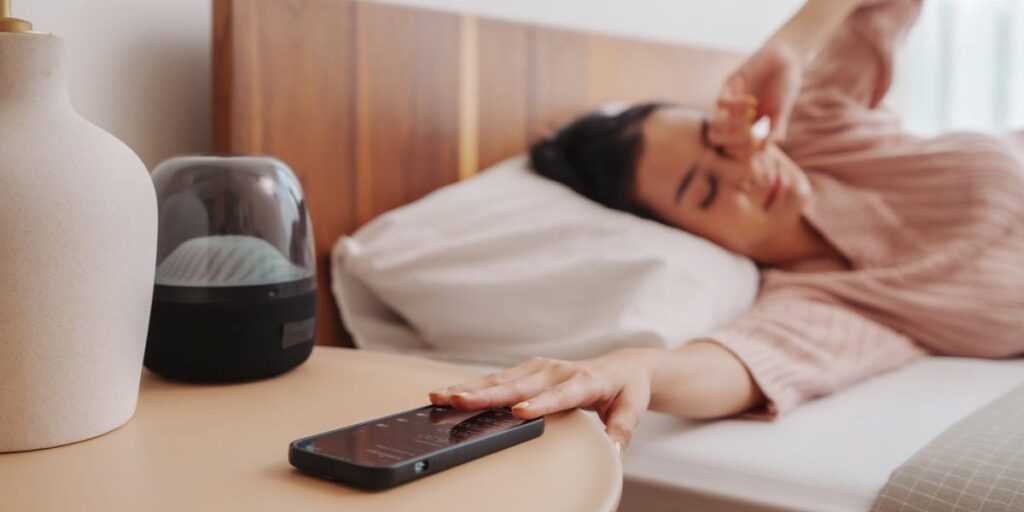- A 2022 sleep study found that 57% of people hit the snooze button regularly.
- A neuroscientist explains how hitting the snooze button can fragment your last minutes of sleep.
- She also explains how then being late can raise your cortisol levels and make you more stressed.
At 6:45 a.m., your first alarm goes off, and you press the snooze button. 6:54 a.m., your second alarm goes off, and again, you hit snooze. Then again, every nine minutes until you realize you can’t press the snooze button anymore or you’ll be late for work.
A 2022 study found that 57% of us fall into this category of snoozers, but how can that impact our minds and bodies?
Hitting the snooze button fragments your sleep
According to Emily McDonald, a neuroscientist based in Florida, waking to multiple alarms disrupts the later phases of sleep, such as REM sleep and slow wave sleep (deep sleep).
“Let’s say you start your day with 30 minutes of snoozing — your last 30 minutes of sleep was poor-quality interrupted sleep. So, pressing snooze once or twice may not be the worst thing, but more than that is not advised due to its effects on cognition and mood,” McDonald told Business Insider.
“If the first alarm sounds and jolts you out of slow wave sleep (deep sleep) or REM, pressing snooze allows you to re-enter into a lighter stage of sleep (N1 or N2) before having to fully wake up,” McDonald said.
She explains that sleep inertia is a transition period from sleep to wakefulness that is characterized by impaired performance and drowsiness. Research shows snoozers are more likely to feel drowsy when they wake up, but they are also more likely to be night owls, which probably also lends to the feeling of drowsiness.
Cristina Garcia, Assistant Clinical Professor of Psychiatry at the University of Arizona and owner of the Center for Sleep and Psychological Wellness, LLC, agrees with this. She says that setting multiple alarms can cause us to feel more sleep inertia, which will make the whole waking-up process harder emotionally and mentally.
“Assuming you don’t fall back to sleep between each alarm, then what you’re doing is teaching yourself to ignore your alarms and instead hang out in bed awake. This is a no-no from a sleep hygiene perspective and probably from a family/job/school/productivity perspective, too,” Garcia told BI.
You shouldn’t hit snooze for a long time
McDonald also notes that every time your alarm clock startles you awake, your body releases cortisol — a hormone produced by your adrenal glands in response to stress. According to studies, this can impact your blood pressure and heart rate. Researchers also found that an elevated cortisol level stimulates appetite meaning that stress can cause fat and sugar cravings.
For McDonald, it’s really the amount of time that you snooze that determines the amount of sleep you are disrupting. So in her opinion, snoozing for a long time is not advised.
“Studies show that immediately after waking up, snoozers experience a slight improvement in alertness, but this effect disappears after about 40 minutes. Meaning that it really does not impact your day to press snooze a couple of times,” McDonald said.
Despite there being a lack of evidence to suggest that snoozing is harmful to the brain, McDonald does not recommend setting multiple alarms, or snoozing more than once. She explains that it’s not the best habit to have if you want to set yourself up for a productive day.
“A morning routine is critical for a relaxed nervous system, focus, productivity, and staying on track toward your goals. If you snooze your alarm for an extra 30 minutes of sleep, then rush around your home to get ready for whatever you have to get to in the morning, you start your day activating the stress response,” McDonald said.
Garcia agrees with this, saying that if your goal is to sleep better, then disrupting the last portion of your sleep is not going to help. “Instead, decide on how much time you really actually need to get ready, then set your alarm accordingly — and maybe choose a different sound and make it louder. Next, include at least one enjoyable experience in your morning so that your morning routine is a bit more attractive and motivating. Then, test it out and adjust as needed. Sometimes working with a professional here is a great way to get additional support, ideas, and accountability,” Garcia said.
Read the full article here
















